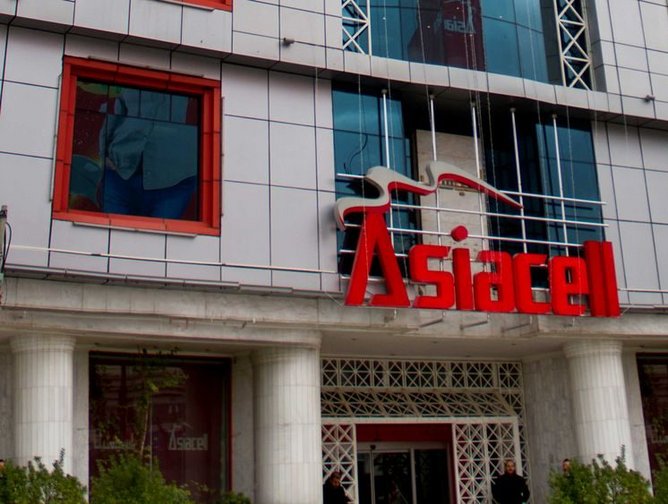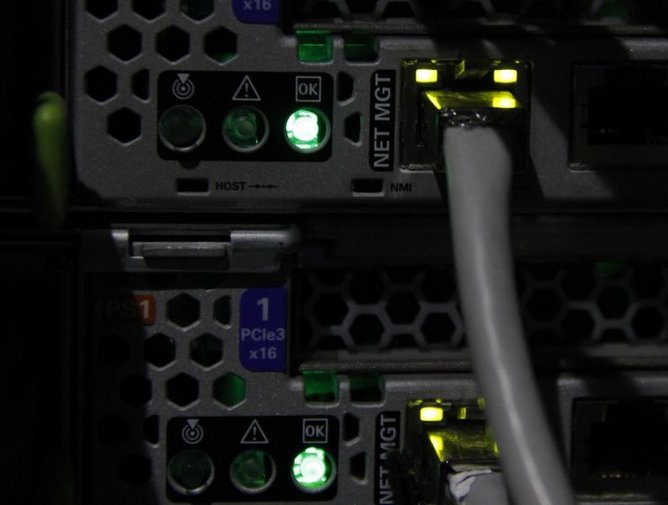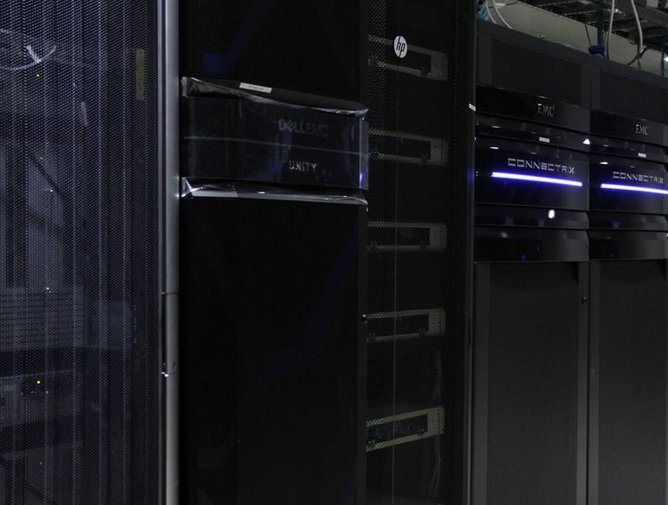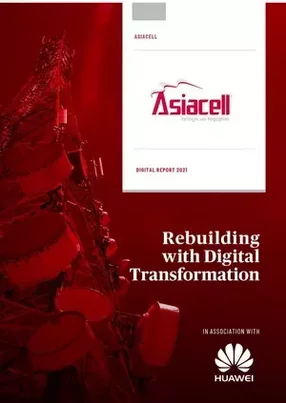Asiacell: Delivering reliability and customer-centricity with digital transformation
Iraq is a nation on the mend. Decades of civil unrest, compounded by war with the US coalition in the early 2000s and the ascendance of the Islamic State in 2014, put the country on the back foot for much of recent history. Now, however, things are changing rapidly.
“The powers of darkness that took over this country and put it into survival mode are gone,” says Amir Abdelazim, Chief Technology and Information Officer at Asiacell, Iraq’s largest telecom operator.
Abdelazim, who joined the Asiacell team early in 2019, adds that the process of rebuilding Iraq is underway. For Asiacell, he believes that this historic period of time not only represents a significant opportunity for growth, but also a debt of responsibility that Asiacell owes to the people of Iraq. “You can't rebuild a great nation in 2020 without putting the telecom sector at the heart of your efforts,” he explains.
“Asiacell is at the heart of that effort. We’re the number one player in the Iraqi market. There's a kind of inherent loyalty that its customers and employees have to the brand. Customers believe in what Asiacell is delivering, but they also expect the very best from us.”
In order to capitalise on new opportunities, expand its footprint and live up to the expectations of its customers, Asiacell is undergoing an accelerated digital transformation project of a magnitude so far unprecedented in the history of the company and the country as a whole.
“Our customers are hungry for digital revolution,” Abdelazim explains. “If you want to maintain your position as number one, and make sure that your subscribers are actually happy with you and growing in number, you have to actually give them the very best of the digital services they are hungry for.” We sat down with Abdelazim to discuss how Asiacell is radically overhauling its digital infrastructure, reprogramming its culture, and delivering the best possible range of services to its 14mn customers.
Defining the journey
“As the leading provider in the market, your customers are already expecting the impossible from you. You should be ready to deliver the impossible to them,” says Abdelazim. In order to deliver on its customer promises, Asiacell has established two core pillars of its transformation. First, Asiacell is working to ensure that its services are as reliable as possible. And second, those services must be customer-centric. Abdelazim stresses that, “Every step we've taken has been on these two legs.”
Digital transformation is more than just a buzzword at Asiacell. For Abdelazim and his team, digital transformation is a powerful problem-solving tool. “We made it our mission to use our digital transformation to deliver a reliable service and to bring the customer inside our business,” he adds. “So we started an ambitious program of restructuring everything we do to become the digital partner that every Iraqi customer looks for.” In order to use its digital transformation to deliver this reliable, customer-centric service, Asiacell is reimagining three core elements of its business.
Infrastructure for a digital revolution
The first step for Abdelazim and his team was to assess the company’s infrastructure capabilities in order to identify the changes needed for it to be capable of supporting Asiacell’s goals. As a result, Asiacell has begun a radical redistribution of its core network, from three sites in major Iraqi cities to 18 locations across the country.
“When you're approaching digital transformation, you can't ignore your connectivity,” Abdelazim continues. With this in mind, Asiacell has reevaluated its connectivity capabilities from the ground up in preparation for the move to 4G and beyond. In order to better meet the expectations of a new generation of mobile users, Abdelazim explains that significant changes are needed. “Our customers view mobile data as a bread and butter solution these days,” he says. “The expectations of millennials regarding how long a website takes to load, for example, have required a lot of transformation from us to be able to deliver the kind of speeds and availability they expect.” Over the course of 2019 and 2020, Asiacell has made blanket 3G available across its entire network, as well as laying the groundwork for total 4G penetration.
In order to deliver a faster, more stable network experience for its customers, Asiacell is also undergoing an expansion of its fibre infrastructure. “We're taking fibre very seriously. We started an ambitious program with a first phase rollout of more than 2,000km of fibre inside Iraq’s metro areas,” Abdalazim explains, adding that by 2023, Asiacell plans to introduce more than 10,000km of new fibre into its network.
“In any other market, this would have been a five to 10-year journey to accomplish. With the amazing team and amazing partnerships we have here in Iraq, we are more than halfway through the project already,” he notes. “We've had network expenditure of more than $500mn in the last year alone. We've deployed the latest technologies across our operations like artificial intelligence and the automation of functions like monitoring and optimisation of the network.”
Becoming a first-choice digital partner
“We want to be the best choice for every organisation and digital partner in Iraq,” says Abdelazim. He notes that this aim requires Asiacell to capture two different segments of the market. On the one hand, there are end users and on the other are corporate and SME clients.
“Those enterprise customers demand reliability and trust, and one of the best ways to earn that trust is through international certifications and global acknowledgement of your infrastructure,” Abdelazim explains. Asiacell’s data centre portfolio is expanding massively across the entirety of Iraq. In the past two years, the company has added 12 new data centres to its portfolio. Two of these facilities have already received Tier III certification from the Uptime Institute, with three more soon to follow.
“It's very important to use to make sure that our data centres are built to the highest standard of technology,” insists Abdemazim. “By the end of 2021, we will have at least one data centre in each of the Iraqi governorates and five of them will be Tier III certified.”
Hand-in-hand with culture and process transformation
Introducing new technology and revitalising infrastructure can only be a successful part of a digital transformation if the human element is also taken into account. “Change management is probably the most important angle of this transformation. Now that we are delivering a lot of new technologies and investments into our network, we need to get our people ready for it,” says Abdelazim, saying that cultural change management must go hand in hand with technological transformation. Asiacell has, he explains, started a complete restructuring of its internal processes and operating model.
“We're using different restructuring programs, different skill injections, different retraining programs and different partnerships in order to ensure that our team is working harmoniously with the new infrastructure and modes of service delivery.”
He notes, however, that this isn’t a simple case of throwing out the old and adopting a new blanket system across the whole organisation. “It's about applying the right style to the right team. We deploy agile methodology to the teams that need agility. We deploy stricter, more process-oriented transformation within the teams that need that approach.” With a diverse new range of strategies tailored to the different needs and functions of the business, Abdelazim believes that Asiacell is in the process of deeply embedding fact-based decision-making tendencies and an operational excellence mindset into its teams.
Abdelazim adds that the transition, from a company working hard to stay operational during the hellish three year reign of the Islamic State over the region, to one working to usher in a new era for Iraq’s digital economy, undoubtedly requires an attitude adjustment.
“You have to bear in mind that Iraq is coming out of some tough times, when the mindset of the organisation was more focused on just surviving,” he says. “The kinds of obstacles and issues that our team was facing on a day-to-day basis were unique. We're talking about the disturbance of war and, in the middle of a conflict, still delivering a service. That survival mindset is fit for the purpose of that time. Now, if we want to be a part of the rebuilding and transformation of the whole country - not just the telecom industry - we're going to have to change from our side.”
The right partner for every problem
In the modern business landscape, no enterprise can succeed without strong partnerships. “Partnerships are the way you do business nowadays. You cannot do things alone,” says Abdelazim. He adds that it’s important to remember, however, that there is no such thing as a good or bad partner, just the right partner at the right time to solve the right problem. “The way we slice up our business into the service delivery, infrastructure and operational segments, we make sure that we choose the right partner for us in each domain,” he explains.
“When you're looking for a partner for your core business, you want a reliable partner. But when you're looking to do things based around agile, fast-moving digital entertainment services, you need an agile, fast moving partner. We're very careful in our choices of partners and suppliers to make sure that the mix is right and that our chosen partners harmonise with our team.”
New services
The third step in Asiacell’s digital transformation is the introduction of new offerings to its customers. “We’re reimagining the services we provide to also become an entertainment partner to our customers - we're going to be the go-to one-stop-shop for our customers when they want any digital service,” says Abdelazim. He notes that, when you account for the disruptive impact of COVID-19, Asiacell’s two decision pillars of reliability and customer-centricity have proven themselves to be sound footing.
“With the sharp increase in e-learning, e-health, e-government - all of which have to be reliable - we were lucky that reliability was one of our core goals from the beginning,” he adds.
The transformative effects of COVID-19
Despite the painful effects of the COVID-19 pandemic on people across Iraq, Abdelazim reflects that that crisis actually accelerated Asiacell’s digital transformation. By taking both short and long-term measures, Asiacell has weathered the pandemic’s first year, and is preparing for a world that will never return to the way things were before March 2020.
“From my point of view, COVID-19 is here to stay - not as a virus, hopefully, but in terms of its impact on peoples' lives,” he explains. “I think we have a lot to learn about the shape of a post-COVID-19 world. Customer behaviours will change, demand will change, and we will need to be more agile than usual to adapt.”
Into the digital revolution
The road ahead for Asiacell is being paved by the digital transformation underway today. The company’s infrastructure rollout will lead to mass 4G adoption; the transformation of its culture and processes will grant it the agility and commitment to fully utilise its new digital capabilities; and its new channels and services will help capture new customers and ensure that its existing ones remain satisfied.
“The next phase of our digital transformation is about microservices for our customers. It's about making sure that we're closer to our customers with our distributed network core. It's about making sure that our metro infrastructure keeps growing. And it's about making sure that it is reliable,” says Abdelazim.
“2021 is about 4G. It's about metro. And it's about digital transformation. 2022 will be more about conquering the enterprise business in the country and becoming the no-brainer choice for our customers in that space. Beyond 2022, we're looking at 5G, automation, smart cities, the introduction of IoT into the market. Given the accelerated development that we are doing here, by then the market will be ready for those innovations. We are persistent. And we will always remain in the lead.”




